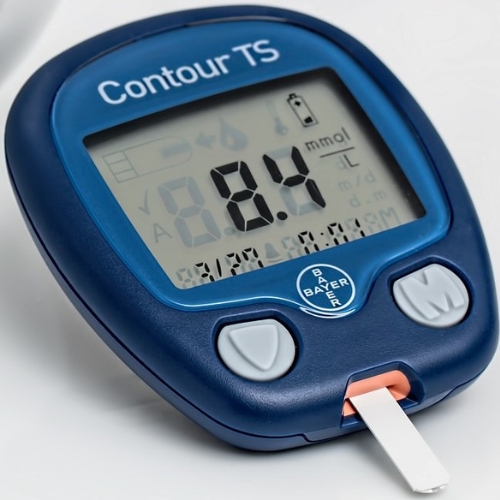Ageing affects everyone, but not at the same pace. Some people remain energetic and disease-free well into old age, while others develop health complications earlier. Scientists have long sought ways to measure and predict biological ageing, which reflects how well the body is functioning rather than just counting the number of years lived.
Recent research highlights the role of metabolic health in the ageing process. Insulin resistance, a condition where the body struggles to use insulin effectively, plays a major role in ageing and age-related diseases. The triglyceride-glucose (TyG) index, a simple measure of insulin resistance, may offer insight into how metabolic dysfunction accelerates ageing.
A new study analyzed U.S. adults' health data and found a strong link between the TyG index and biological ageing. These findings suggest that metabolic health influences how fast or slow a person ages.
Understanding the TyG Index
The TyG index is calculated using fasting blood glucose and triglyceride levels. Both of these markers play essential roles in metabolism:
Triglycerides are fats stored in the blood that provide energy. High levels indicate poor metabolic health.
Glucose is the body's primary energy source. High fasting glucose suggests insulin resistance.
By combining these values, the TyG index provides a reliable estimate of insulin resistance without requiring invasive tests like insulin clamps or fasting insulin measurements.
How Metabolism and Ageing Are Connected
Biological ageing results from accumulated damage at the cellular level. Insulin resistance speeds up this damage by increasing oxidative stress and chronic inflammation, both of which contribute to tissue deterioration, organ dysfunction, and a higher risk of chronic diseases.
The TyG index has already been linked to conditions such as diabetes, cardiovascular disease, and metabolic syndrome. However, its direct impact on biological ageing was not well understood until this study examined its connection to ageing-related biomarkers.
Study Overview
Researchers used data from the National Health and Nutrition Examination Survey (NHANES), which included over 12,000 U.S. adults aged 20 and older. The study analyzed two established methods for measuring biological age:
Klemera–Doubal method (KDM): This model estimates biological age using multiple health indicators, including blood pressure, kidney function, and inflammatory markers.
Phenotypic age: This measure incorporates ten clinical biomarkers, including albumin, white blood cell count, and glucose levels, to assess the risk of ageing-related diseases and death.
The researchers examined whether higher TyG index levels correlated with increased biological age and a higher likelihood of accelerated ageing—a state where biological age exceeds chronological age.
What the Study Found
The findings revealed a strong and consistent association between the TyG index and biological ageing:
A 1-unit increase in the TyG index was linked to a 1.64-year rise in KDM biological age.
The same increase was associated with a 117% higher risk of accelerated ageing when using KDM biological age as a measure.
When measured using phenotypic age, each 1-unit increase in TyG led to a 0.40-year increase in biological age and a 15% increase in the risk of accelerated ageing.
A key threshold emerged at a TyG index of 8.66. Below this value, biological age increased at a steady rate. Above this value, ageing accelerated significantly. This suggests that individuals with a TyG index higher than 8.66 may experience faster physical and metabolic deterioration than those with lower levels.
The Role of Insulin Resistance in Ageing
Insulin resistance disrupts the body's ability to regulate glucose and lipids, leading to long-term damage. Several mechanisms explain why higher TyG levels are linked to faster ageing:
Increased Oxidative Stress: Insulin resistance produces excess free radicals, which damage DNA, proteins, and cell structures. This accelerates ageing at a molecular level.
Chronic Inflammation: High TyG levels are associated with increased inflammatory markers, which contribute to ageing-related diseases like arthritis, cardiovascular disease, and neurodegeneration.
Vascular Damage: Insulin resistance impairs blood vessel function, leading to poor circulation, increased blood pressure, and a higher risk of stroke and heart disease—all of which speed up ageing.
Metabolic Syndrome: The TyG index is strongly linked to obesity, high cholesterol, and hypertension. These conditions collectively contribute to biological ageing and a shorter lifespan.
Who Is Most at Risk?
The study also examined whether certain groups were more affected by the TyG index’s impact on ageing. Subgroup analyses found that the link between the TyG index and biological ageing was consistent across all groups, but some populations faced higher risks:
Older adults showed a stronger relationship between TyG and biological ageing.
Men had higher TyG index values than women, increasing their risk of metabolic ageing.
Individuals with diabetes and hypertension were more likely to experience accelerated ageing when their TyG index was high.
These results suggest that controlling insulin resistance could be key to slowing biological ageing, particularly for individuals at higher risk.
Why These Findings Matter
This study provides new evidence that metabolic health plays a crucial role in the ageing process. The TyG index, a simple and widely available measure, could serve as an early warning sign for accelerated ageing.
Unlike genetic tests or expensive biomarker panels, the TyG index is easy to calculate and can be measured through routine blood tests. This makes it a practical tool for identifying individuals at risk of premature ageing and age-related diseases.
How to Lower the TyG Index and Slow Ageing
While genetic factors play a role in ageing, lifestyle choices significantly influence biological age. Reducing the TyG index may help slow down ageing and improve overall health. Here are some ways to achieve this:
1. Improve Diet Quality
Reduce added sugars and refined carbohydrates to prevent insulin spikes.
Consume healthy fats, such as those found in nuts, fish, and olive oil, to improve lipid metabolism.
Increase fiber intake with vegetables, legumes, and whole grains to enhance insulin sensitivity.
2. Exercise Regularly
Strength training improves glucose metabolism and reduces insulin resistance.
Aerobic exercise helps regulate triglyceride and glucose levels.
High-intensity interval training (HIIT) has been shown to lower the TyG index effectively.
3. Maintain a Healthy Weight
Excess body fat, especially around the abdomen, contributes to insulin resistance.
Losing even 5–10% of body weight can significantly reduce the TyG index.
4. Improve Sleep and Manage Stress
Poor sleep increases cortisol, a stress hormone that raises blood sugar levels.
Mindfulness practices such as meditation and yoga can improve insulin sensitivity.
Final Thoughts
This study is the first to demonstrate a direct connection between the TyG index and biological ageing. The findings suggest that higher insulin resistance leads to faster ageing, increasing the risk of chronic diseases.
By identifying metabolic health as a key driver of ageing, this research highlights the importance of early detection and intervention. Monitoring the TyG index could help individuals take proactive steps to maintain a longer, healthier life.
For those looking to slow the ageing process, optimizing metabolic health through diet, exercise, and lifestyle changes may be the best strategy for ageing gracefully.
The study is published in the journal Cardiovascular Diabetology. It was led by researchers from Yuying Children’s Hospital of Wenzhou Medical University,.







